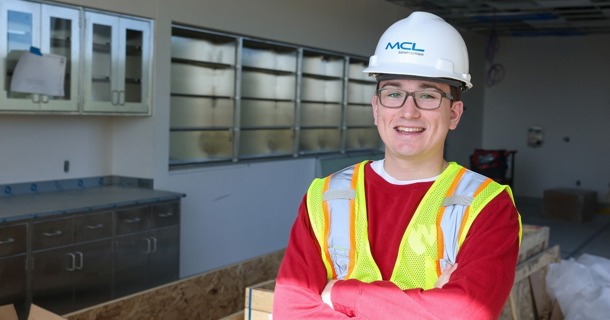‘There is tremendous interest and excitement’: New UNK-UNMC building will provide health care training close to home

KEARNEY – The new Health Science Education Center is visually stunning.
Located in the northwest corner of the University of Nebraska at Kearney campus, the three-story, 110,000-square-foot facility will feature state-of-the-art classrooms, cutting-edge technology and extensive simulation and clinical skills laboratories.
It’s going to be an impressive building when it opens early next year.
Carter Schultz is understandably excited for that moment, but there’s a more meaningful milestone that occurs first. He’ll start professional school this fall as part of the inaugural cohort of students enrolled in the University of Nebraska Medical Center pharmacy program launching in Kearney.
“I think it’s super cool that students at UNK now have the opportunity to pursue their professional program closer to home,” Schultz said. “Many of us are very passionate about staying in rural Nebraska, and the strong partnership between UNK and UNMC creates more opportunities for that to happen. I’m really excited to not only start pharmacy school but to do so in a location that I want to be in.”
WORKING TOGETHER
A $95 million project, the Health Science Education Center II – previously referred to as the Rural Health Education Building – is the latest example of a longstanding effort to grow the state’s health care workforce and improve access to these services in rural areas.
UNK and UNMC opened the Health Science Education Complex – now known as the Health Science Education Center I – in fall 2015. Also located on UNK’s west campus, that building allowed UNMC to expand its undergraduate and graduate nursing programs in Kearney and offer allied health programs here for the first time, making them more accessible to students from central and western Nebraska.
The 46,000-square-foot facility currently serves more than 300 students pursuing degrees in high-demand areas such as medical laboratory science, medical nutrition, nursing, occupational therapy, physical therapy, physician assistant, radiography and sonography. About 85% of the students who graduate from UNMC programs in Kearney start their careers in rural Nebraska.
“The collaborative nature of the relationship between UNK and UNMC has been one of the keys to the success of the rural health initiatives in Kearney,” said Peggy Abels, director of UNK Health Sciences. “Each institution has a distinct role, but we are working together in a cooperative way to alleviate the shortage of health care professionals in our state. UNK is working to generate health care career awareness, recruit students and provide them with the foundational knowledge to be successful in their health care training. UNMC brought its programs to the students and is providing them with high-quality health care education and clinical training.”
CONTINUED GROWTH
The second Health Science Education Center builds on this success by opening the door for even more students to study and train in central Nebraska.
Supported by funding from the Nebraska Legislature, city of Kearney, Central Community College and numerous benefactors, including the William and Ruth Scott Family Foundation, the new building allows UNMC to further expand its allied health and nursing programs in Kearney. UNMC is also bringing three more programs to the UNK campus, marking the first time physicians, pharmacists and public health professionals will be trained in rural Nebraska.
With another facility on campus, UNMC’s enrollment in Kearney will double, bringing the total to more than 600 students.
Abels called the project a win-win for everyone involved – future health care providers, the NU System, rural hospitals and clinics and residents across the state.
“Being from rural Nebraska myself, I understand the challenges around access to care in rural communities,” she said. “Reducing the shortage of health care professionals in rural areas is critical to providing that access. The new Health Science Education Center will allow us to develop this workforce by meeting students where they are. It will also be important to the growth of health sciences at UNK as more students are attracted to campus with the goal of receiving their UNMC education and training in central Nebraska.”
Bolstered by recruitment and career awareness initiatives such as Health Science Explorers and the Kearney Health Opportunities Program (KHOP), UNK has seen a significant increase in the number of students planning to pursue a health care career in recent years. There will be nearly 900 health science students on campus this fall, with roughly 40% of the applications from incoming freshmen indicating an interest in this field of study.
RIGHT FIT
Schultz grew up in Doniphan, a small town about 45 miles east of Kearney, and chose UNK because he liked the close-knit campus and opportunities available for health science students. He was selected for KHOP, another partnership between UNK and UNMC designed to grow the state’s health care workforce.
Launched in 2010, that program is available to students from rural Nebraska who are committed to practicing in these communities as health care professionals. Schultz received a full-tuition scholarship and housing assistance during his time at UNK, along with academic support and professional development opportunities. After completing the pre-pharmacy program, he was guaranteed admission to professional school at UNMC.
“KHOP was a big part of my decision to attend UNK,” Schultz said. “Obviously the scholarship is awesome, but I think the most valuable thing is the connections that I’ve been able to make. You’re participating in activities and taking classes with a bunch of future doctors, dentists, physical therapists, pharmacists and other health care professionals, developing relationships that are going to help you so much in the future. I’ll start pharmacy school with a group of six or seven people who I’m super close with because I’ve been in KHOP with them for the last three years.”
Schultz was also part of the UNK Health Science Club and he continues to be involved with the Catholic Newman Center and Delta Tau Delta fraternity. He’ll serve as an assistant hall director for UNK Residence Life this fall while taking classes through UNMC and working as a pharmacy technician at U-Save Pharmacy in Kearney.
When the time comes, he wants to begin his career at a smaller, community pharmacy where he can create “meaningful connections” with patients.
“I truly believe health care is the best way to make a positive impact on people’s lives,” Schultz said. “It’s important for people to not only have access to these services but to have access to professionals who sincerely care about them.”
REGIONAL IMPACT
In addition to providing expanded health care education and training, the new Health Science Education Center will enhance clinical research and play a pivotal role in economic development. When fully operational, the Douglas A. Kristensen Rural Health Education Complex, which includes buildings I and II, will support about 240 local jobs and have an annual economic impact estimated at $34.5 million.
Many of the students studying here will complete clinicals in the same communities they’ll serve after graduation.
“Partnering with UNMC to bring health care education to Kearney not only provides opportunities for students, but it also strengthens the entire region,” Abels said. “There is tremendous interest and excitement across the state about the opening of the second building. Providers, clinics and hospitals are reaching out for information and wanting to be involved. Many are already asking about how they might be able to work with students needing clinical rotations, internships and placements.”
“UNK Health Sciences has a Hospital Partners program made up of rural hospitals around the state, and representatives from a number of those hospitals have visited campus over the last year to learn more and see the construction in progress,” she added. “They left excited about the potential of the initiative.”
